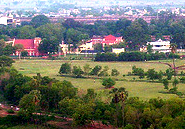Welcome to Jamalpur the world’s most beautiful place! Munger, Bihar
Welcome to Jamalpur ||Munger, BiharArchive for Jamalpur News
We have called a 12-hour strike in Jamalpur tomorrow
A 65-year-old labourer was allegedly beaten to death by a group of farmers in Burdwan when a meeting to discuss the workers’ demand for a revision of daily wages escalated into a clash.
Radhanath Soren, who is also a CPM worker, was taken to Jamalpur health centre where he was pronounced dead.
Over 100 farm labourers in Nabagram have for the past three days refused to cultivate the fields at a time seeds are being sown for the aman (monsoon) crop.
The workers have been demanding that their daily wage be increased by Rs 50-60 to Rs 120.
Today, the farmers, most of whom are Trinamul supporters, called the labourers to a meeting to discuss their demand.
The meeting, which was attended by around 60 farmers and 75 labourers, started with a bargain but it soon snowballed into an argument and then a clash, Radhanath’s grandson Sunil said.
“We (the labourers) scaled down our demand to Rs 100 a day (from Rs 120) but they would not agree to anything more than Rs 80. An argument broke out and some farmers slapped and punched some of us.
“My grandfather went to pacify both the sides but he was kicked and punched by the farmers. We took him to Jamalpur health centre but he was declared dead there,” Sunil said.
District superintendent of police S.M.H. Meerza said seven persons have been arrested.
Asked if Radhanath was singled out because of his links with the CPM, another police officer ruled out such a possibility.
Radhanath’s son Sahadeb, lodged an FIR on the basis of which the arrests were made, the officer said. Among the arrested persons were Ashok Ghosh, the Trinamul president in Nabagram gram panchayat.
District CPM secretary Amal Haldar said Radhanath was killed “because he was leading the agitation against the farmers”. “We have called a 12-hour strike in Jamalpur tomorrow,” Haldar added.
Local Trinamul MLA Ujjal Pramanik denied Radhanath was beaten to death by the farmers and insisted he died of a heart attack.
“After the meeting ended, Radhanath returned home and died of a heart attack after two hours. Trinamul has nothing to do with his death. The CPM is trying to politicise the incident,” Pramanik said.
According to the Burdwan assistant labour commissioner, Asit Baran Roy, there are three rates fixed by the government for farm labourers. “For skilled, semi-skilled and unskilled farm labourers, the daily rates range from Rs 155 to Rs 202,” Roy said.
An official of the labour department admitted that in many areas in the district, employers do not pay the government rates to the labourers.
Source: http://www.telegraphindia.com/1120724/jsp/bengal/story_15765250.jsp#.UBJvq6Bv-iM
No takers, highway blocked with vegetables
Around 500 vegetable farmers in Burdwan today blocked the Memari-Tarakeswar state highway for an hour by dumping their produce on the road, holding the government responsible for the absence of wholesalers from the market.
The farmers alleged the drop in prices had driven the wholesalers away.
Farmers in villages around Jamalpur grow ribbed gourd (jhinge), lady’s finger (bhindi) and wax gourd (potol). Every day, around 1,000 farmers bring their produce to the market near Sure Kalna station, from where the wholesalers or aggregators — known as phore — pick up the vegetables.
The farmers said that for the past two days, no wholesaler had turned up at the market.
“What will we do with our produce if we can’t sell them?” asked Kaushik Das, a 32-year-old farmer from Karalaghat village who had come to the market around five in the morning.
Soon, more farmers from different villages reached the market, carrying their produce on cycle vans. But the bulk buyers, who take their produce to big markets in Calcutta and elsewhere, were not there.
“The wholesalers are not coming to the market to protest the government’s efforts to forcibly reduce the prices of vegetables. Wholesalers are rich and they can survive, but we can’t,” Das said.
The farmers then dumped their produce on the road and blocked it for an hour. A team from Jamalpur police station persuaded them to lift the blockade.
Even though the protests by the farmers looked spontaneous, Calcutta-based economists said the perceived reason for the wholesalers’ disappearance may not be correct.
The farmers seemed convinced that the aggregators had turned away because of the government vigil on markets after the Mamata Banerjee administration set up a monitoring committee last week.
“It is likely that the wholesalers are again trying to manipulate the market…. They know that a few days’ absence from the farmers’ market will result in a drop in supply in city markets and prices will go up. Besides, they will also gain, as farmers will be selling their produce at a lower price after failing to do so for a few days,” said a Calcutta-based economist who refused to be named.
Source:
According to him, wholesalers wield enormous clout in the supply chain of vegetables from the farm to the food plate in the cities and have got used to super-normal profits.
The Telegraph had reported last week how products like ribbed gourd, which farmers were selling at Rs 5-6 a kg, were priced at Rs 40-45 a kg in several Calcutta markets because of profiteering at each transhipment point where the product changed hands. “A vigilant government machinery has ensured that the wholesalers’ profit margins have shrunk. That’s why they are reacting like this,” the economist said.
The farmers at Jamalpur, however, were not aware of the alleged shenanigans of the aggregators as they said the wholesalers were not responsible for the recent spike in prices.
“The middlemen are responsible for the hike…. The wholesalers are playing it safe as they have realised that the government is targeting them. That’s why we can’t sell our produce,” a farmer said.
However, in an imperfect market, even a wholesaler or an aggregator can behave like a middleman by extracting margins and pushing up prices.

















